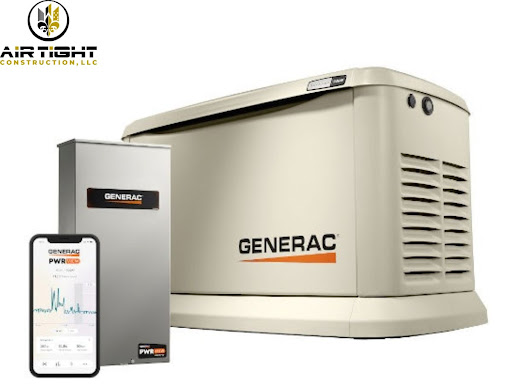Imagining our modern life without electricity even for a few minutes is unimaginable. Our life is dependent on electricity in a major way, and irrespective of what we do in our life, power has turned out to be a fulcrum of our everyday life. Power outages can be a huge inconvenience for us. Power outages can bring our life to a screeching halt by disrupting our daily activities. It will not be an exaggeration to claim that power outages can be even a threat to our personal safety. Look around yourself. From elevators to trains, we depend on electricity for so many things in our lives that even a short power outage can throw our lives off kilter. To reduce any risk posed by power cuts, many households opt to invest in Whole House Generac Generators.
These standby generators come in handy in the event of power cuts and save you from so many unwanted things. However, with so many models and options available, one feels confused about which one to buy. In this blog, we discuss in detail 6 crucial questions to ask before buying a home standby generator. These half-a dozen questions will help you in identifying your needs and making the right decision.
1. What size generator do I need?
The first vital question you need to ask yourself is about the size of the generator. Generators come in different sizes. Big generators are usually for commercial purposes, while a small one can be effective for a home. Nevertheless, the size of your generator will be influenced by the kind of need you have. If you have a palatial home, a small generator will not be of much use. But if you live in a condo or flats, a small generator will be required. Another factor to be borne in mind when deciding on the size of a generator is the number of appliances you have at your home. If you have a large number of appliances and if all of them need to be powered, then go for a big-size generator. Before deciding on the size of the generator, you will have to take into consideration two things: (1) the running wattage and (2) the starting wattage of the appliances you will be using.
Running wattage refers to the amount of power an appliance needs to operate continuously while starting wattage refers to the extra power needed to start up the appliance. You’ll need to make sure that your generator is capable of supplying enough starting wattage to power all of your appliances, as well as the continuous running wattage.
2. The kind of fuel the generator use:
It is very vital to know what kind of fuel a generator uses before you can buy it. There are three types of fuel used by some standby generators. These fuels are (1) propane (2) diesel, and (3) natural gas.
Propane is popular because of its easy availability and affordability. But there is one drawback with propane. It is difficult to store large quantities of propane in your home or warehouse.
Diesel generators are more fuel efficient compared to propane generators. Another advantage of a diesel generator is its capacity to run longer on a single tank of fuel than a propane-powered generator. But diesel is costlier than propane. Additionally, diesel generators are more expensive than propane-powered generators.
It will not come as a surprise to you to know that natural gas generators are becoming increasingly popular with users. There are many reasons behind the increasing popularity of natural gas generators. The main reason is growing awareness about climate change and a desire to switch from fossil fuels to natural fuels. However, natural gas generators can be more expensive to purchase and install than propane or diesel generators, and you’ll need to ensure that your home has a natural gas connection in order to use this type of generator.
3. What is the generator’s noise level?
You will ignore this question only if you want to regret it later. The noise level of a generator is as essential a factor in deciding whether to purchase it or not as other factors listed above. Home standby generators can be quite noisy, which can be a concern if you have neighbours nearby or if you’re using the generator in a residential area. When shopping for a home standby generator, it’s important to pay attention to the noise level of the generator, which is typically measured in decibels (dB).
Most home standby generators produce between 60 and 70 dB of noise, which is roughly equivalent to the noise level of a normal conversation. However, some generators are designed to be quieter than others, and it’s worth considering a quieter model if noise is a concern for you.
4. How reliable is the generator?
Reliability is another important factor to consider when buying a home standby generator. After all, you want to be sure that your generator will be able to provide power when you need it, especially during extended power outages.
When researching different generators, pay attention to the manufacturer’s reliability rating, as well as the warranty that’s included with the generator. You’ll also want to consider factors like the generator’s maintenance requirements and any potential issues that other customers have reported.
5. How easy is the generator to install?
You don’t want a bulky, cumbersome to handle a generator. Choose a standby generator that is easy to install by professionals. A difficult-to-install generator will become a headache for you and it can pose safety risks as well.
Conclusion:
Before you buy a generator, there are a few questions that you need to ask. Effectiveness, efficiency, cost, noise level, Heating and Air Conditioning are the type of fuel used, size, etc, are crucial factors that you need to ponder before buying a standby generator for your home or workplace. It is true that generators nowadays have become indispensable. Our lives depend heavily on electricity. Imagining our lives without electricity even for a few minutes can trigger anxiety and rightly so.
Before you order a standby generator, ensure you have done your research. Try to find out which size you need and what is your requirement. Once you have figured out the utility of a generator for you, research its noise level. Having a noisy generator at home can be quite pesky. And if you have neighbours, then you cannot afford to install a noisy standby generator as that would risk complaints against you. In the times we are living in, there is a gradual shift from fossil fuels to natural gas. Though natural gas is costlier than fossil fuel or propane, its benefits compensate for its costliness. Don’t rush through your purchase. Buy only after having done your research thoroughly.


